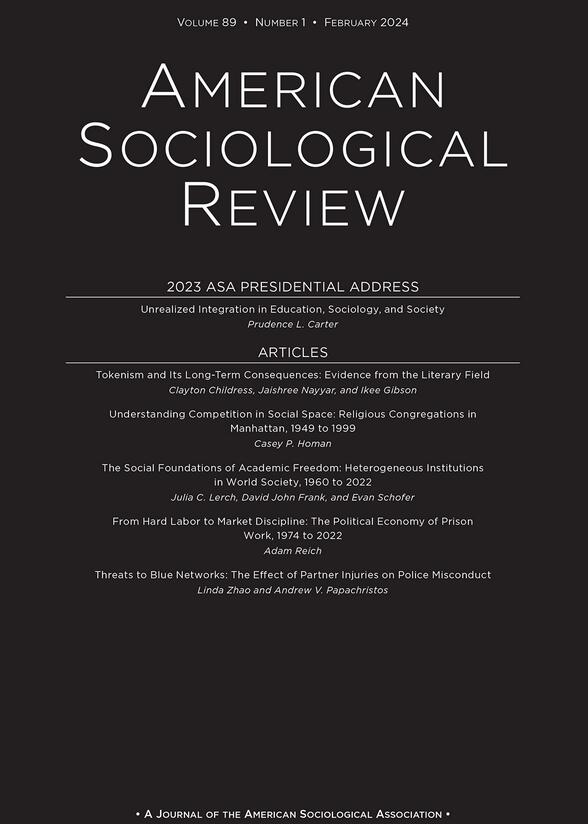Collaborating in Class: Social Class Context and Peer Help-Seeking and Help-Giving in an Elite Engineering School
IF 6.2
1区 社会学
Q1 SOCIOLOGY
引用次数: 2
Abstract
Scholars have extensively documented social class differences in students’ relationships with educational institutions through their interactions with authority figures and the unequal institutional advantages these interactions yield. However, little is known about whether or how social class also shapes students’ peer interactions in ways that produce these inequalities. Using a qualitative case study of an elite engineering school in which I draw on participant observation and interviews with 88 undergraduates and six administrators, I argue that social class context—a proxy for social class—shapes the peer help-seeking and help-giving (collaborative) strategies students use, which can create inequalities in the institutional advantages they secure in the form of academic help, support, and learning opportunities. Focusing specifically on the social class context of students’ high schools, I find that compared to their less-privileged counterparts, privileged students—who came from class-advantaged high school contexts where they became familiar with collaboration and upper-middle-class cultural signals—more easily collaborated with their college classmates and displayed signals that communicated they were “good” collaborators. The findings highlight new mechanisms through which inequalities are reproduced in educational institutions and make theoretical contributions to research on cultural capital, inequality, and education.课堂合作:一所精英工程学校的社会阶层背景与同伴寻求与给予帮助
学者们通过与权威人物的互动,广泛记录了学生与教育机构关系中的社会阶级差异,以及这些互动产生的不平等制度优势。然而,人们对社会阶层是否或如何以产生这些不平等的方式影响学生的同伴互动知之甚少。通过对一所精英工程学校的定性案例研究,我利用参与者的观察和对88名本科生和6名管理人员的采访,认为社会阶级背景——社会阶级的代表——塑造了学生使用的同伴寻求帮助和给予帮助(协作)策略,这可能会在他们以学术帮助、支持和学习机会的形式获得的制度优势方面造成不平等。特别关注学生高中的社会阶级背景,我发现与他们的弱势同龄人相比,特权学生——他们来自阶级优越的高中环境,在那里他们熟悉了合作和中上层文化信号——更容易与大学同学合作,并表现出他们是“好”合作者的信号。研究结果强调了在教育机构中再现不平等现象的新机制,并为文化资本、不平等和教育研究做出了理论贡献。
本文章由计算机程序翻译,如有差异,请以英文原文为准。
求助全文
约1分钟内获得全文
求助全文
来源期刊

American Sociological Review
SOCIOLOGY-
CiteScore
13.30
自引率
3.30%
发文量
35
期刊介绍:
The American Sociological Association (ASA) is a non-profit membership association established in 1905. Its mission is to advance sociology as a scientific discipline and profession that serves the public good. ASA is comprised of approximately 12,000 members including faculty members, researchers, practitioners, and students in the field of sociology. Roughly 20% of the members work in government, business, or non-profit organizations.
One of ASA's primary endeavors is the publication and dissemination of important sociological research. To this end, they founded the American Sociological Review (ASR) in 1936. ASR is the flagship journal of the association and publishes original works that are of general interest and contribute to the advancement of sociology. The journal seeks to publish new theoretical developments, research results that enhance our understanding of fundamental social processes, and significant methodological innovations. ASR welcomes submissions from all areas of sociology, placing an emphasis on exceptional quality.
Aside from ASR, ASA also publishes 14 professional journals and magazines. Additionally, they organize an annual meeting that attracts over 6,000 participants. ASA's membership consists of scholars, professionals, and students dedicated to the study and application of sociology in various domains of society.
 求助内容:
求助内容: 应助结果提醒方式:
应助结果提醒方式:


